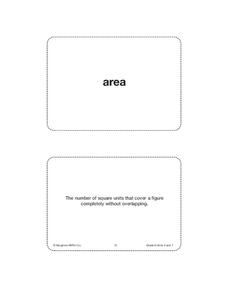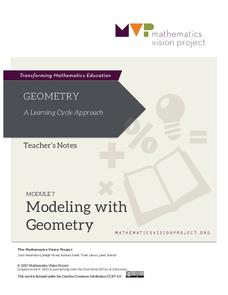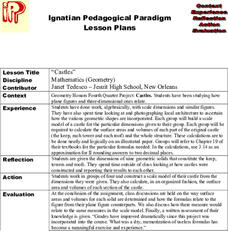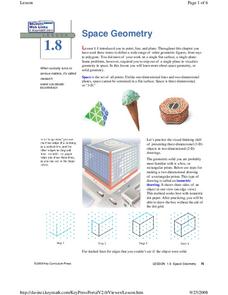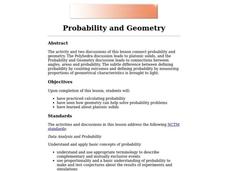PBS
Surface Area and Volume
You and your class will like this lesson on using visual models to relate the volume and surface area of solid shapes. Learners construct three-dimensional forms using nets. They calculate the surface area and volume for each and then...
Curated OER
Nature's Polyhedrons
Students are introduced to polyhedrons through using straw models to explore geometric solids and constructing Christmas tree ornaments using Epsom salt crystals. Students will view interactive videos and investigate and retrieve...
Santa Monica College
Introducing Measurements in the Laboratory
We use basic units of measurement to break down things and communicate clearly. The first activity in an 11-part series teaches the proper way to measure various items. It starts simply with measuring the dimensions and areas of...
Illustrative Mathematics
Box of Clay
What happens to a volume when you scale the dimensions of a rectangular prism? In this problem, a box of clay is increased in each dimension, with the intent to see if learners can generalize the result. The addition of...
Curated OER
Geometry Journal: Classifying Solids
In this geometry worksheet, 10th graders respond to journal prompts related to prisms and classifying solid shapes. The two page worksheet contains nine questions. Answers are included.
Curated OER
It Matters
Learners use descriptive vocabulary to discuss the attributes of matter. Then, they sort objects or pictures by the type of matter they are comprised of. Finally, students match objects of matter with similar attributes and create a...
Houghton Mifflin Harcourt
Unit 7 Math Vocabulary Cards (Grade 6)
Thirty-eight flashcards make up a set designed to reinforce math vocabulary. Two types of cards can be found here; a word card in bold lettering, and a corresponding definition card that offers a labeled example. Terms include area,...
Mathematics Vision Project
Module 7: Modeling with Geometry
Model good modeling practices. Young mathematicians first learn about cross sections and solids of revolution. They then turn their attention to special right triangles and to the Laws of Sine and Cosine.
EngageNY
End-of-Module Assessment Task - Geometry (module 3)
It's test time! Determine your class's understanding of the topics of volume and cross sections with a thorough assessment on volume, area, and geometric shapes.
Pennsylvania Department of Education
A Geometric Scavenger Hunt
Fifth graders connect their knowledge of polygons and polyhedrons. In this geometric shapes lesson, 5th graders identify and classify two- and three-dimensional objects. Students construct a polyhedron out of polygons and describe their...
Curated OER
Surface Area and Volume of a Cylinder
Seventh graders find the surface area and volume of a cylinder. In this area and volume lesson, 7th graders complete several activities to learn the volume and surface area of cylinders.
Curated OER
Cubic Unit Models
Fourth graders find the volume of solids. In groups, 4th graders use spinners to determine the dimensions of solids. They construct the shapes, creating a model of the figure Students count the cubes in the model to determine the...
Concord Consortium
Bill the Ball Bearing Man
Just how durable could a hollow ball bearing be? Learners model the strength of the walls of a ball bearing as a function of the radius of its cavity. They use their models to make reasonable conclusions about the probability of failure...
Curated OER
The X-33 and the X-38
Pupils explore the relationships among the lengths, areas, and volumes of similar solids. They also discover what effect doubling the dimensions of a figure has on the resulting area.
Pennsylvania Department of Education
Volume of Regular and Irregular Objects
Fifth graders examine patterns and relate to equations to solve math problems. In this patterns lesson plan, 5th graders diagram, graph, use models and use tables to solve equations for real world problems.
Curated OER
Castles
Young scholars create a scale model to a castle using the dimensions they were given. They calculate the surface areas and volumes of each section of their castle.
Houghton Mifflin Harcourt
Unit 6 Math Vocabulary Cards (Grade 4)
In need of math vocabulary cards? Use a set of 66 vocabulary cards with topics focused mostly on geometry terms. Each sheet has two cards on it. The top half has the word printed in bold text, while the bottom half has the card with...
Curated OER
Surface Area of Prisms
Students calculate the surface area of different prisms. In this geometry lesson, students identify the shapes of solids based on the properties of that solid. They calculate the surface area using nets and properties of prisms.
Curated OER
The Louis Vuitton Project, using 3rd degree equations
Students model three-dimensional objects using cubes. In this geometry lesson, students calculate the volume and derived the amount mathematically. They use different objects to create two and three-dimensional objects.
Pennsylvania Department of Education
Volume of Compound Figures
Fifth graders use patterns, models and relationships to solve equations. In this equations lesson, 5th graders define vocabulary for equations and complete worksheets explaining variables and solving problems.
Curated OER
Space Geometry
Students explore points, lines and planes as it relates to geometry. In this geometry lesson, students analyze space and explain wy it is 3-D and not flat or 2-D. They solve problems involving volume and 3-D shapes.
Houghton Mifflin Harcourt
Unit 6 Math Vocabulary Cards (Grade 5)
Acute angles, nets, and vertices are only a few terms that a set of flash cards includes. Among the 108 cards, two types are available; word cards printed in bold-faced lettering, and corresponding definition cards equipped with an...
Curated OER
Polydron Fun
Students investigate nets as they relate to volume and area. For this geometry lesson, students use nets as a visual to deepen their understanding of surface area and volume of objects. They make conjectures about different objects and...
Curated OER
Probability and Geometry
Learners explore the ways Geometry can help solve probability problems. Students describe platonic solids and practice calculating probability using an online resource. They construct dice with various numbers of sides to demonstrate...








